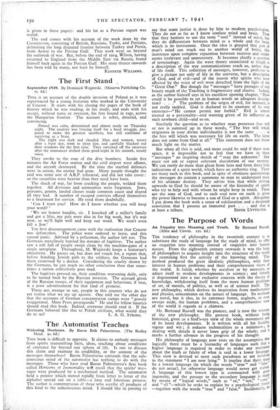The Automatist Teaches
THIS book is difficult to appraise. It claims to embody messages from spirits transmitting facts, ideas, teaching about conditions of existence far beyond our sphere of life. Is one to discuss this claim and examine its credibility, or the content of the messages themselves? Baron Palmstierna contends that the sub- conscious mind of the automatist has nothing to do with the messages. Those who have read Baron Palmstierna's first book called Horizons of Immortality wilt recall that the spirits' mes- sages were produced by a mechanical method. The automatist held a pointer which moved rapidly from letter to letter of the alphabet spread out on a table—a long and laborious process. The author is contemptuous of those who ascribe all products of this kind to the subconscious mind. I should like in passing to say that scant justice is done by him to modern psychologists. They do not as far as I know confuse mind and brain. Trot that they hesitate to use the term " soul " instead of mind, but they do differentiate between mind as a whole and the brain which is its instrument. Once the idea is grasped that part of man's mind can reach out to another world of being, this insistence upon complete separation between receiver and sender seems irrelevant and unnecessary. It becomes chiefly a question of terminology. Again the wave theory enunciated at length is a description of the way communications reach us, rather than of life itself. This collection of messages, however, professes to give a picture not only of life in the universe, but a description of God, and of evil—and of the reason why spirits who were affected by the voice of evil were detached from the light of the " Great One." But though the "messages " have passages of real beauty much of the Teaching is fragmentary and elusive. Indeed, as the author himself says in his excellent opening chapter, "How could it be possible to set in human words an adequate descrip- tion? . . ." The problem of the origin of evil, for instance, is not really tackled. God is declared to be unaware of its very existence—" He cannot permit nor forbid." Evil is almost treated as a personality—and warning given of its influence on each newborn child—and so on.
Similarly the question as to whether man possesses free will or not is summed up in these words, " The free will which originates in your divine individuality is not the same . . . as the free will which was necessary for life on earth. The latter does not come from God at all." This statement does not throw much light on the matter.
But when all this is said, and more could be said if there were space, it is impossible not to feel that we have in these " messages " an inspiring sketch of " man the unknown." One must not ask or expect coherent elucidation of our mystery. We can rarely do more than glean from here and from there little indications of a spirit world, which have an authentic ring. There are many such in this book, and in spite of obstinate questionings the messages do contain a summons to man to understand more of his ultimate destiny. They advise him that while striving upwards to God he should be aware of the hierarchy of spirits who try to help and with whom he might keep in touch. These are the sons of God, and to each soul now on earth is given the power likewise to become a son of God or a spirit. Altogether I put down the book with a sense of exhilaration and a deepened
conviction that I possess an immortal part . . and that is






























 Previous page
Previous page